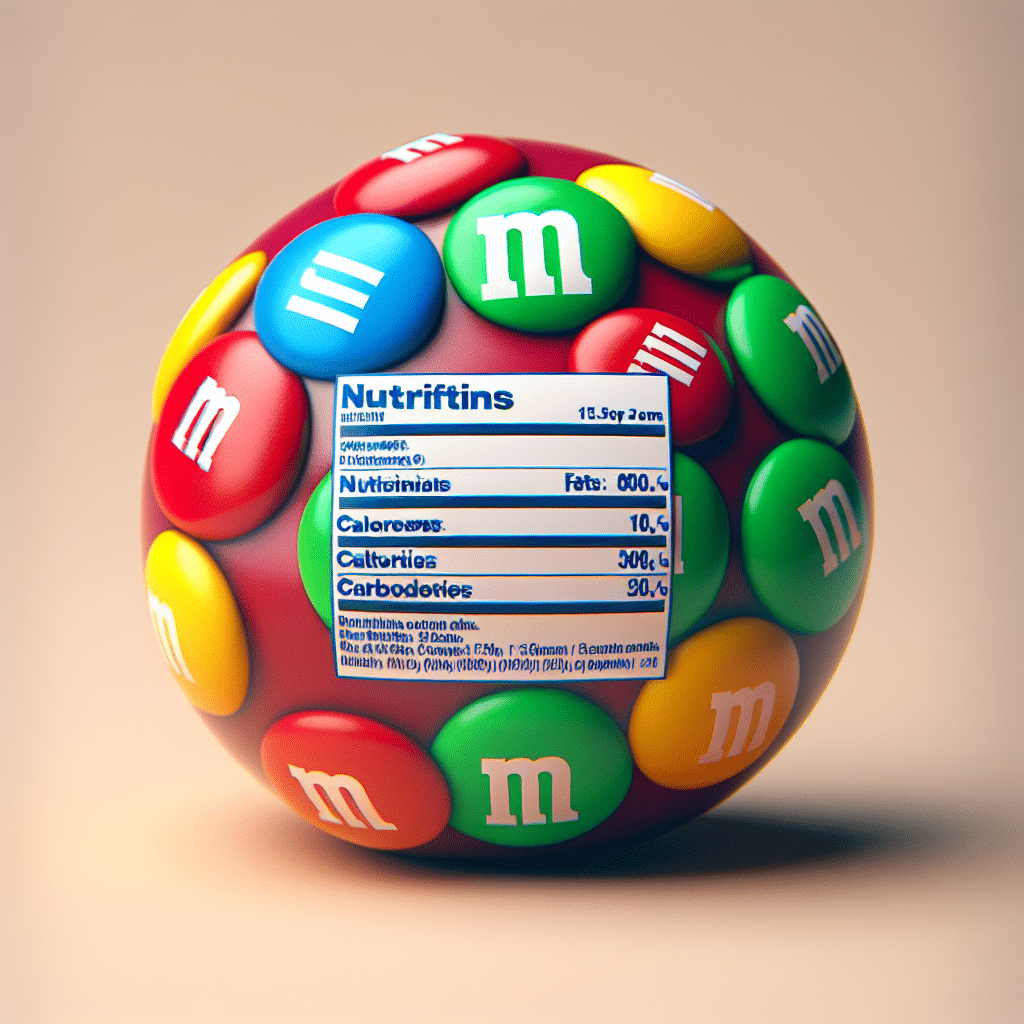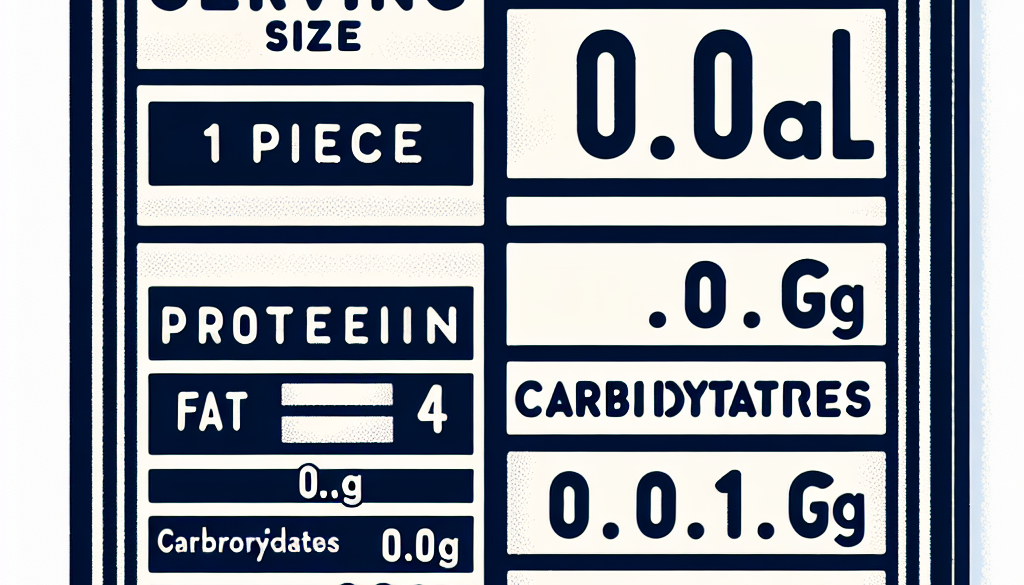1 Mnm: Nutritional Information
-
Table of Contents
- Nutritional Breakdown of 1 M&M: Understanding the Impact on Your Diet
- Caloric Content of 1 M&M
- Macronutrient Composition
- Micro-nutritional Elements
- Added Ingredients and Colorings
- Impact on Health
- Case Studies and Statistics
- Conclusion: Balancing Indulgence and Nutrition
- ETChem’s Protein Products: A Nutritious Alternative
Nutritional Breakdown of 1 M&M: Understanding the Impact on Your Diet

When it comes to satisfying a sweet tooth, M&Ms are a popular choice for many. These colorful, bite-sized candies are not only a treat to the eyes but also a delight to the taste buds. However, as with any indulgence, it’s essential to understand the nutritional implications of adding M&Ms to your diet, even if it’s just one. In this article, we’ll delve into the nutritional information of a single M&M and discuss how it fits into a balanced diet.
Caloric Content of 1 M&M
Calories are the most basic measure of the energy provided by food. A single M&M candy contains approximately 4 calories. While this number seems negligible, it’s important to consider how quickly it can add up. For instance, a standard serving size of M&Ms is about 1.69 ounces (47.9 grams) or about 1/4 cup, which equates to roughly 240 calories. Therefore, mindful consumption is key, especially if you’re watching your caloric intake.
Macronutrient Composition
Understanding the macronutrient breakdown of an M&M can help you see how it fits into your daily dietary needs. Here’s what a single M&M typically comprises:
- Carbohydrates: Each M&M has about 0.6 grams of carbohydrates, primarily from sugars.
- Fats: There’s a small amount of fat in an M&M, roughly 0.2 grams, which includes both saturated and unsaturated fats.
- Protein: M&Ms contain a negligible amount of protein, less than 0.1 grams per piece.
While these macronutrients are essential for energy and various bodily functions, the high sugar content and presence of saturated fat in M&Ms make them a treat that should be consumed in moderation.
Micro-nutritional Elements
Though not significant, M&Ms do contain trace amounts of vitamins and minerals. For example, they provide a small amount of iron and calcium. However, relying on M&Ms for these nutrients is not advisable due to the high sugar content and low overall nutritional value.
Added Ingredients and Colorings
M&Ms are known for their vibrant colors, which are achieved through the use of various food colorings. While these colorings are approved for use in food products, some individuals may be sensitive to them or prefer to avoid artificial additives. Additionally, M&Ms contain other ingredients like emulsifiers and preservatives that contribute to their texture and shelf life.
Impact on Health
Consuming M&Ms in moderation is unlikely to have a significant impact on your health. However, regular and excessive intake of sugary treats like M&Ms can contribute to various health issues, including weight gain, dental problems, and an increased risk of chronic diseases such as type 2 diabetes and heart disease.
Case Studies and Statistics
Research has shown that the consumption of foods high in added sugars, like candy, is associated with poor dietary quality and increased calorie intake. A study published in the “Journal of the Academy of Nutrition and Dietetics” found that participants who consumed more added sugars had lower intakes of essential nutrients.
According to the Centers for Disease Control and Prevention (CDC), the average American consumes about 17 teaspoons of added sugars per day, which is significantly higher than the recommended limit of no more than 12 teaspoons for a 2,000-calorie diet.
Conclusion: Balancing Indulgence and Nutrition
In conclusion, while a single M&M contains only a small amount of calories and nutrients, it’s the cumulative effect of consuming multiple candies that can impact your diet. Moderation is key when enjoying treats like M&Ms. By being mindful of portion sizes and the frequency of consumption, you can enjoy these sweets without compromising your nutritional goals.
ETChem’s Protein Products: A Nutritious Alternative
If you’re looking for a more nutritious snack option that can satisfy your cravings while providing beneficial nutrients, consider exploring ETChem’s protein products. These high-quality protein supplements can be a great addition to a balanced diet, especially for those looking to increase their protein intake for muscle building, weight management, or overall health.
About ETChem:
ETChem, a reputable Chinese Collagen factory manufacturer and supplier, is renowned for producing, stocking, exporting, and delivering the highest quality collagens. They include marine collagen, fish collagen, bovine collagen, chicken collagen, type I collagen, type II collagen, and type III collagen, etc. Their offerings, characterized by a neutral taste, instant solubility attributes, cater to a diverse range of industries. They serve nutraceutical, pharmaceutical, cosmeceutical, veterinary, as well as food and beverage finished product distributors, traders, and manufacturers across Europe, USA, Canada, Australia, Thailand, Japan, Korea, Brazil, and Chile, among others.
ETChem specialization includes exporting and delivering tailor-made collagen powder and finished collagen nutritional supplements. Their extensive product range covers sectors like Food and Beverage, Sports Nutrition, Weight Management, Dietary Supplements, Health and Wellness Products, ensuring comprehensive solutions to meet all your protein needs.
As a trusted company by leading global food and beverage brands and Fortune 500 companies, ETChem reinforces China’s reputation in the global arena. For more information or to sample their products, please contact them and email karen(at)et-chem.com today.




